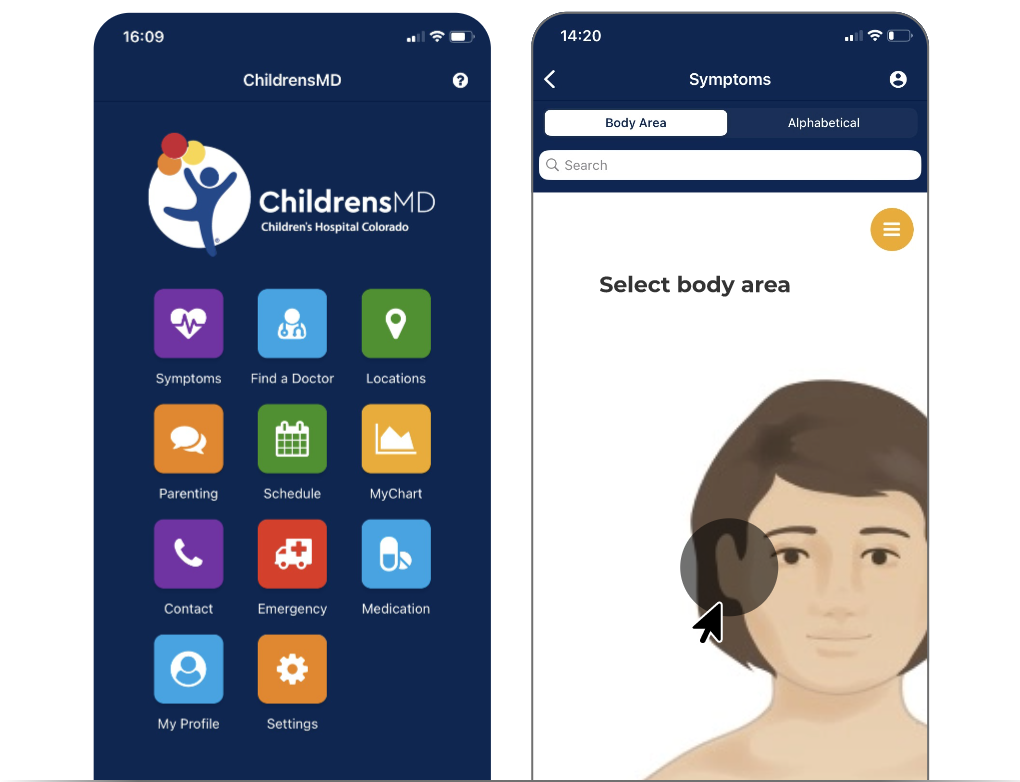- Doctors & Departments
-
Conditions & Advice
- Overview
- Conditions and Symptoms
- Symptom Checker
- Parent Resources
- The Connection Journey
- Calm A Crying Baby
- Sports Articles
- Dosage Tables
- Baby Guide
-
Your Visit
- Overview
- Prepare for Your Visit
- Your Overnight Stay
- Send a Cheer Card
- Family and Patient Resources
- Patient Cost Estimate
- Insurance and Financial Resources
- Online Bill Pay
- Medical Records
- Policies and Procedures
- We Ask Because We Care
Click to find the locations nearest youFind locations by region
See all locations -
Community
- Overview
- Addressing the Youth Mental Health Crisis
- Calendar of Events
- Child Health Advocacy
- Community Health
- Community Partners
- Corporate Relations
- Global Health
- Patient Advocacy
- Patient Stories
- Pediatric Affiliations
- Support Children’s Colorado
- Specialty Outreach Clinics
Your Support Matters
Upcoming Events
Child Life 101
Wednesday, June 12, 2024Join us to learn about the work of a child life specialist, including...
-
Research & Innovation
- Overview
- Pediatric Clinical Trials
- Q: Pediatric Health Advances
- Discoveries and Milestones
- Training and Internships
- Academic Affiliation
- Investigator Resources
- Funding Opportunities
- Center For Innovation
- Support Our Research
- Research Areas

It starts with a Q:
For the latest cutting-edge research, innovative collaborations and remarkable discoveries in child health, read stories from across all our areas of study in Q: Advances and Answers in Pediatric Health.


Diarrhea
Get Care Now
From emergency to urgent care to 24/7 pediatric advice, we’re here to help in the heat of moment.
- Sudden increase in the number and looseness of stools
- Diarrhea means 3 or more watery or very loose stools. Reason: 1 or 2 loose stools can be normal with changes in diet.
Causes of Acute Diarrhea
- Virus (such as Rotavirus). An infection of the intestines from a virus is the most common cause.
- Bacteria (such as Salmonella). Less common cause. Diarrhea often contains streaks of blood.
- Food Poisoning. This causes rapid vomiting and diarrhea within hours after eating the bad food. It is caused by toxins from germs growing in foods left out too long. Most often, symptoms go away in less than 24 hours. It often can be treated at home without the need for medical care.
- Giardia (a parasite). More likely in child care center outbreaks.
- Traveler's Diarrhea. Caused by germs in food or drink. Suspect this if it follows recent foreign travel.
- Antibiotic Diarrhea. Many antibiotics cause mild diarrhea. This is not an allergic reaction. Keep giving the antibiotic. Call your doctor if any serious symptoms occur.
- Serious Causes. Most bacterial diarrhea goes away on its own. A few can cause a severe large bowel infection (such as Shigella colitis). C. difficile is a serious cause that can occur after being on strong antibiotics.
- Serious Complication: Dehydration. This is the health problem where the body has lost too much fluid. (See below for more on this).
Causes of Recurrent Diarrhea
- Cow's Milk Allergy. Can cause loose, slimy stools in babies. Can be blood-streaked. Starts within the first 2 months of life. Need to avoid cow's milk formulas.
- Toddler's Diarrhea. Toddlers who pass 3 to 6 sloppy stools per day. Stools may run out of the diaper. Symptoms begin at age 1. Symptoms resolve at age 3 or 4, after toilet trained. Harmless and no impact on growth. Fruit juice makes it worse. The cause is rapid transit time from stomach to anus. May develop irritable bowel syndrome (IBS) in adult years.
- Lactose Intolerance. Lactose is the sugar in milk. Many people cannot absorb lactose. The gut bacteria convert the lactose to gas. The main symptoms are a lot of gas, loose stools and stomach bloating. Onset usually at age 4 or 5. This most often runs in the family (genetic).
Diarrhea Scale
- Mild: 3-5 watery stools per day
- Moderate: 6-9 watery stools per day
- Severe: 10 or more watery stools per day
- The main risk of diarrhea is dehydration.
- Loose or runny stools do not cause dehydration.
- Frequent, watery stools can cause dehydration.
Dehydration: How to Know
- Dehydration means that the body has lost too much fluid. This can happen with vomiting and/or diarrhea. A weight loss of more than 3% is needed. Mild diarrhea or mild vomiting does not cause this. Neither does a small decrease in fluid intake.
- Dehydration is the most important problem caused by diarrhea. Dehydration is a reason to see your doctor right away.
- These are signs of dehydration:
- Decreased urine (no urine in more than 8 hours) happens early in dehydration. So does a dark yellow color. If the urine is light straw colored, your child is not dehydrated.
- Dry tongue and inside of the mouth. Dry lips are not helpful.
- Dry eyes with decreased or absent tears
- In babies, a depressed or sunken soft spot
- Slow blood refill test: longer than 2 seconds. First, press on the thumbnail and make it pale. Then let go. Count the seconds it takes for the nail to turn pink again. Ask your doctor to teach you how to do this test.
- Fussy, tired out or acting ill. If your child is alert, happy and playful, he or she is not dehydrated.
- A child with severe dehydration becomes too weak to stand. They can also be very dizzy when trying to stand.
Diarrhea in Breastfed Babies: How to Tell
- Diarrhea in a breastfed baby is sometimes hard to tell.
- Normal breastfed stools are loose (often runny and seedy). Stools are yellow, but sometimes can be green. The green color is from bile. Runny stools can even be bordered by a water ring. These are all normal stools.
- Breastfed babies often pass more than 6 stools per day. Until 2 months of age, they may pass a stool after each feeding. But, if stools suddenly increase in number and looseness, suspect diarrhea. If it lasts for 3 or more stools, the baby has diarrhea.
- If the stools contain mucus, blood or smell bad, this points to diarrhea.
- Other clues to diarrhea are poor eating, acting sick, or a fever.
Diarrhea in Formula-Fed Infants: How to Tell
- Formula-fed babies pass 1 to 8 stools per day during the first week. Then it starts to slow down to 1 to 4 per day. This lasts until 2 months of age.
- The stools are yellow in color and thick like peanut butter.
- Suspect diarrhea if the stools suddenly increase in number or looseness. If it lasts for 3 or more stools, the baby has diarrhea.
- If the stools contain mucus, blood, or smells bad, this points to diarrhea.
- Other clues to diarrhea are poor eating, acting sick or a fever.
- After 2 months of age, most babies pass 1 or 2 stools per day. They can also pass 1 every other day. They no longer appear to have mild diarrhea.
Call 911 Now
- Not moving
- Too weak or dizzy to stand
- You think your child has a life-threatening emergency
Call Doctor or Seek Care Now
- Dehydration suspected. No urine in more than 8 hours, dark urine, very dry mouth and no tears.
- Blood in the stool
- Constant stomach pain lasts more than 2 hours
- Vomits clear liquids 3 or more times
- Age less than 1 month with 3 or more diarrhea stools in past 24 hours
- Severe diarrhea. 10 or more watery stools in the last 24 hours.
- Fever higher than 104° F (40° C)
- Fever in baby less than 12 weeks old. Caution: do NOT give your baby any fever medicine before being seen.
- Weak immune system. Examples are: sickle cell disease, HIV, cancer, organ transplant, taking oral steroids.
- Your child looks or acts very sick
- You think your child needs to be seen, and the problem is urgent
Contact Doctor Within 24 Hours
- Moderate diarrhea. 6 or more watery stools in the last 24 hours.
- Stomach pains that do not go away after each diarrhea stool
- Loss of bowel control in a toilet trained child occurs 3 or more times
- Fever lasts more than 3 days
- Close contact with person or animal who has bacterial diarrhea
- Contact with reptile (snake, lizard, turtle) in past 14 days
- Travel to country at risk for diarrhea within past month
- You think your child needs to be seen, but the problem is not urgent
Contact Doctor During Office Hours
- Diarrhea lasts more than 2 weeks
- Loose stools are a frequent problem
- You have other questions or concerns
Self Care at Home
- Mild diarrhea (probably caused by a virus)
- Diarrhea disease: how to prevent
Care Advice for Diarrhea
Treatment for Mild Diarrhea
What You Should Know About Diarrhea:
- Most diarrhea is caused by a virus.
- Bacterial infections as a cause of diarrhea are not common.
- Diarrhea is the body's way of getting rid of the germs.
- The main risk of diarrhea is dehydration. Dehydration means the body has lost too much fluid.
- Most children with diarrhea don't need to see their doctor.
- Note: 1 or 2 loose stools can be normal with changes in diet. Diarrheal illness means 3 or more watery stools per day.
- Here are some tips on how to keep ahead of the fluid losses.
Mild Diarrhea:
- Most kids with diarrhea can eat a normal diet.
- Drink more fluids to prevent dehydration. Formula, breastmilk and/or regular milk are good choices for diarrhea.
- Do not use fruit juices or full-strength sports drinks. Reason: they can make diarrhea worse.
- Solid foods: eat more starchy foods (such as cereal, crackers, rice, pasta). Reason: they are easy to digest.
Formula-Fed Babies with Frequent, Watery Diarrhea:
- Keep giving formula but feed more often. Offer as much formula as your child will take.
- Mix formula the normal way. Reason: the formula contains plenty of water and doesn't need more.
- Solid foods: if on baby foods, continue them. Cereals are best.
Breastfed Babies with Frequent, Watery Diarrhea:
- Give your baby breastmilk more often.
- Also, give extra fluid if breast milk isn't keeping up with the fluid losses. You can use formula or ORS (Pedialyte).
- Solid foods: if on baby foods, continue them. Cereals are best.
Older Children (age more than 1 year old) with Frequent, Watery Diarrhea:
- Offer as much fluid as your child will drink. If also eating solid foods, water is fine. So is half-strength Gatorade or half-strength apple juice.
- If won't eat solid foods, give milk or formula as the fluid.
- Caution: do not use most fruit juices, full-strength sports drinks or soft drinks. Reason: they can make diarrhea worse.
- Solid foods: starchy foods are easy to digest and best. Offer cereals, bread, crackers, rice, pasta or mashed potatoes. Pretzels or salty crackers will help add some salt to meals. Some salt is good.
Oral Rehydration Solutions (ORS), such as Pedialyte:
- ORS is a special fluid that can help your child stay hydrated. You can use Pedialyte or the store brand. It can be bought in food stores or drug stores.
- When to use: start ORS for frequent, watery diarrhea if you think your child is getting dehydrated. That means passing less urine than normal. Increase fluids using ORS. Continue giving breastmilk, formula or regular milk.
- Amount: for babies, give 2-4 ounces (60-120 mL) of ORS after every large watery stool.
- For children over 1 year old, give 4-8 ounces (120-240 mL) of ORS after every large watery stool. Children rarely need ORS after age 3.
- Caution: do not give ORS as the only fluid for more than 6 hours. Reason: your child will need calories and cry in hunger.
Probiotics:
- Probiotics are healthy bacteria (such as Lactobacilli). They can replace harmful bacteria in the gut (stomach).
- Probiotics may be helpful in reducing the number of diarrhea stools.
- Yogurt is the easiest source of probiotics.
- If your child is taking solids (4 to 6 months of age), give 1 to 2 ounces (30 - 60 mL) of plain yogurt twice daily.
- If older than 12 months, give 2 to 6 ounces (60 to 180 mL) of yogurt twice daily. Note: today, almost all yogurts are "active culture."
- Yogurts that are lactose-free may be even more helpful.
Fever Medicine:
- For fevers higher than 102° F (39° C), give an acetaminophen product (such as Tylenol).
- Another choice is an ibuprofen product (such as Advil).
- Note: fevers less than 102° F (39° C) are important for fighting infections.
- For all fevers: keep your child well hydrated. Give lots of cold fluids.
Diaper Rash - Prevention:
- Wash buttocks after each stool to prevent a bad diaper rash.
- To protect the skin, use an ointment (such as Vaseline or Desitin). Put it on the skin around the anus.
Return to School:
- Your child can go back to school after the stools are formed.
- The fever should also be gone.
- The older child can go back if the diarrhea is mild.
- The toilet trained child also needs to have good control over loose stools.
What to Expect:
- Viral diarrhea lasts 5-14 days.
- Severe diarrhea only occurs on the first 1 or 2 days. But, loose stools can last for 1 to 2 weeks.
Call Your Doctor If:
- Blood in the diarrhea
- Dehydration suspected (no urine in over 8 hours, dark urine, very dry mouth, and no tears)
- Diarrhea lasts over 2 weeks
- You think your child needs to be seen
- Your child becomes worse
Preventing Diarrhea Disease
Safety Tips in All Countries:
- Hand washing is the key to preventing the spread of infections.
- Always wash the hands before eating, feeding or handling young children or cooking.
- Always wash the hands after any contact with vomit or stools.
- Wash the hands after using the toilet or changing diapers. Help young children wash their hands after using the toilet.
- Cook all poultry fully. Never serve chicken that is still pink inside. Reason: undercooked poultry is a common cause of diarrhea in developed countries.
Extra Safety Tips in Developing Countries:
- Drink bottled water or boiled water. Avoid tap water, ice cubes and flavored ices.
- Eat foods that have been fully cooked and that are still hot.
- Dry foods such as bread are usually safe.
- Avoid salads and raw vegetables. Avoid fruits that cannot be peeled. Bananas, oranges and apples are safe. Wash your hands before peeling fruit.
- Avoid all undercooked meat and fish.
- Avoid buying foods and drinks from street vendors. Reason: this is a common cause of traveler's diarrhea.
- Formula for babies: breastfeed if possible. If not, use premixed formula. If you prepare your own, mix the formula with bottled or boiled water.
- Feeding babies: wash bottles, nipples, spoons and dishes with soap and water. Then sterilize them in boiling water for 5 minutes if possible.
- Brush your teeth with bottled or boiled water.
Call Your Doctor If:
- You have other questions or concerns
Copyright 2000-2024. Schmitt Pediatric Guidelines LLC.
Disclaimer: this health information is for educational purposes only. You, the reader, assume full responsibility for how you choose to use it.

Get to know our pediatric experts.

Pooja Mehta, MD
Gastroenterology - Pediatric

Victoria Cohen, CPNP-PC
Pediatrics

Rupal Deitz, CPNP-PC
Certified Pediatric Nurse Practitioner

Daniel Searing, MD
Allergy & Immunology, Pediatrics



 720-777-0123
720-777-0123





